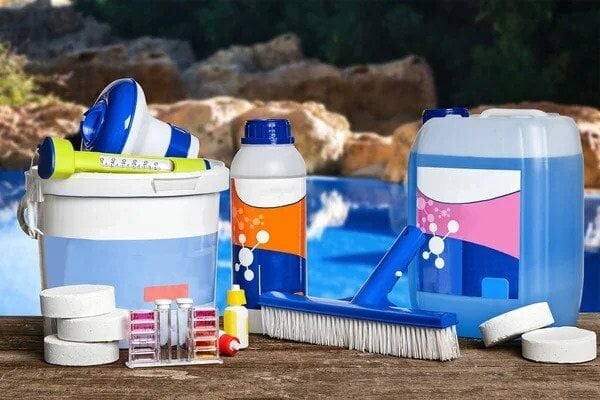Chemical Use in the Pool

Pool Chemicals
Various chemicals are necessary to keep the swimming pool clean and healthy. Here are some essential chemicals you should use for regular pool maintenance:
Chlorine: Chlorine is used to disinfect pool water. Chlorine inhibits the growth of bacteria, viruses and other microorganisms. By adding chlorine to your pool, you can keep the water clean and healthy.
pH regulator: The pH level of the pool determines whether the water is acidic or alkaline. The right pH level increases the effectiveness of the chlorine and relaxes the water. The pH regulator helps to keep the pH level in the desired range.
Alkaline regulator: The alkaline regulator helps regulate the alkalinity of the pool. The alkalinity level helps maintain the pH balance and ensures that the pH remains within the desired range.
Shock agent: If the water in the pool loses chlorine over time or microorganisms accumulate in it, a shock agent is added to the pool. The shock agent rapidly increases the chlorine level of the pool, causing the microorganisms to die.
Algae inhibitor: Algae inhibitor is used to prevent algae growth. Algae inhibitor keeps the pool clean and clear.
Algae killer: If algae occurs in the pool, algae killer is used. An algaecide helps clean the pool by killing algae. These chemicals are necessary to keep the pool clean and hygienic. In addition to these, other chemicals may need to be used depending on factors such as pool size, water temperature and frequency of use. Correct use and dosage of chemicals are important when maintaining a swimming pool. It is important that you use chemicals that meet your pool's specific needs and local guidelines. It is recommended to contact a professional who specializes in swimming pool maintenance.
Swimming pools: Chemicals such as chlorine, pH regulators, alkalinity regulators, shock agents and algae inhibitors are used in the daily maintenance of swimming pools. These chemicals keep a pool clean and healthy and inhibit the growth of bacteria and microorganisms.
Spas and hot tubs: Pool chemicals are also used to keep spas and hot tubs clean and hygienic. Water quality in these areas is ensured by chemicals such as chlorine, pH regulators and shocking agents.
Water parks and water parks: Large water parks and water parks are heavily used areas. In such areas, pool chemicals are important in terms of water disinfection, pH balance and hygiene.
Hotels and Resorts: Resorts, hotels, and resorts often have large swimming pools. Allaskemikailit ensures that its customers benefit from the pools in such areas in a healthy and safe way.
Educational facilities and sports facilities: Educational and sports facilities such as schools, universities and sports fields have swimming pools. In these areas, water quality is maintained and hygiene is ensured by using pool chemicals. Private Houses and House Pools: Pool chemicals are also used in private pools used by house owners. This keeps the water clean and healthy, and family members can safely enjoy the pool.
Use of pool chemicals typically depends on factors such as pool size, frequency and intensity of use, and water quality. Pool owners or managers can keep the pool clean and hygienic on a regular basis by choosing chemicals that meet the specific needs of the pool.
What Do Pool Chemicals Do?
Pool chemicals are used to clean, disinfect and stabilize a swimming pool. The main functions of pool chemicals are as follows:
Disinfection: Pool chemicals keep the pool hygienic by killing bacteria, viruses, fungi and other microorganisms in the water. Chlorine, which is used as the most common disinfectant, ensures that the water is purified from microorganisms.
pH balance: The pH level of the pool determines whether the water is acidic or alkaline. The correct pH value not only increases the effectiveness of chlorine, but also provides suitable and safe water. The pH level of the water is regulated by the pH regulators.
Balancing Alkalinity: Alkalinity is a property that helps maintain the pH balance of water. If the alkalinity level is kept within the appropriate range, pH fluctuations are prevented and the water becomes more stable. The alkalinity level of the water is regulated by alkalinity regulators.
Algae Prevention: Algae preventive chemicals are used to prevent algae formation in pool water. Algae can make water cloudy, green and muddy. Algae inhibitors inhibit the growth of algae and keep the water clean and clear.
Filtration and particle retention: The filters used in swimming pools ensure that the particles in the water are cleaned. Auxiliary chemicals in the filter increase the efficiency of the filters, facilitate the retention of particles and make the water clearer.
By performing these functions, pool chemicals ensure that the pool water is clean, hygienic, balanced and clear, allowing you to have a healthy and enjoyable pool experience.Which Chlorine Should Be Used For The Pool?
Chlorine Tablets (Trichloroisocyanuric Acid Tablets): Chlorine tablets are a form of chlorine commonly used in automatic dosing systems. Tablets release chlorine slowly and continuously. As these tablets contain stabilizers, they protect against UV rays and help retain pool water chlorine for a longer period of time. When using chlorine tablets, the stabilizer level should be checked regularly because excessive buildup of stabilizer can affect the stability of the water.
You can buy pool chemicals products from the link here https://www.misa.com.tr/kategori/havuz-chemicals
When to enter the pool after adding chlorine?
Chlorine Tablets (Trichloroisocyanuric Acid Tablets): Chlorine tablets are a form of chlorine commonly used in automatic dosing systems. Tablets release chlorine slowly and continuously. As these tablets contain stabilizers, they protect against UV rays and help retain pool water chlorine for a longer period of time. When using chlorine tablets, the stabilizer level should be checked regularly because excessive buildup of stabilizer can affect the stability of the water.
